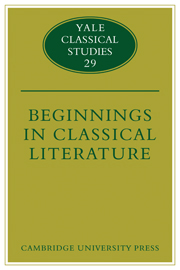Book contents
- Frontmatter
- Contents
- Introduction: beginning at Colonus
- How Greek poems begin
- The Muse corrects: the opening of the Odyssey
- Sappho 16, Gorgias' Helen, and the preface to Herodotus' Histories
- Tragic beginnings: narration, voice, and authority in the prologues of Greek drama
- Plato's first words
- Plautine negotiations: the Poenulus prologue unpacked
- Proems in the middle
- Openings in Horace's Satires and Odes: poet, patron, and audience
- An aristocracy of virtue: Seneca on the beginnings of wisdom
- Beginnings in Plutarch's Lives
- “Initium mihi operis Servius Galba iterum T. Vinius consules …”
Beginnings in Plutarch's Lives
Published online by Cambridge University Press: 10 January 2011
- Frontmatter
- Contents
- Introduction: beginning at Colonus
- How Greek poems begin
- The Muse corrects: the opening of the Odyssey
- Sappho 16, Gorgias' Helen, and the preface to Herodotus' Histories
- Tragic beginnings: narration, voice, and authority in the prologues of Greek drama
- Plato's first words
- Plautine negotiations: the Poenulus prologue unpacked
- Proems in the middle
- Openings in Horace's Satires and Odes: poet, patron, and audience
- An aristocracy of virtue: Seneca on the beginnings of wisdom
- Beginnings in Plutarch's Lives
- “Initium mihi operis Servius Galba iterum T. Vinius consules …”
Summary
“Men can do nothing without the make-belief of a beginning.” “Make-belief,” because in the world of action it is objectively impossible to isolate a putative first step within the chain of contiguous causes and consequences. Current thinking frowns upon the axioms of origin, of authorship, of the unitary validating enactment. In the swirl of contextualization and dialogicity, a genuine starting point will go down as a dubious fiction. “The genesis…is never more than a transition from one structure to another, but also a formative transition that leads from a weaker to a stronger structure.” Edward Said borrows Hayden White's deprecatory coinage “inaugural gestures” to convey the artificiality and delusoriness of a sense of beginning. He lists the various ways in which “beginning” can be understood: as physical exigency, as a departure from an antecedent, as a moment in time, a place, a principle, an action, a verbal stratagem of easing into sequence. His expansive temper and his commitment to renewal condition him to see in a genuine beginning a revolutionary element, challenging the conventions but also harnessed by the structures of the context. Nowhere in his massive book does Said provide a discussion of how a writer's first paragraph relates to the larger enterprise; his concern is with the total enterprise as a beginning.
- Type
- Chapter
- Information
- Beginnings in Classical Literature , pp. 205 - 230Publisher: Cambridge University PressPrint publication year: 1992
- 5
- Cited by



